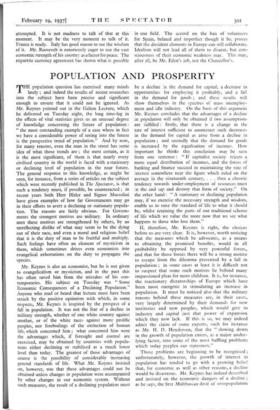POPULATION AND PROSPERITY
T' population question has exercised many minds lately ; and indeed the results of recent researches into the subject have been precise and significant enough to ensure that it could not be ignored. As Mr. Keynes pointed out in the Galton Lecture, which he delivered on Tuesday night, the long time-lag in the effects of vital statistics gives us an unusual degree of knowledge concerning the future of population : "the most outstanding example of a case where in fact we have a considerable power of seeing into the future is the prospective trend of population." And by now, for many reasons, even the man in the street has some idea of what those trends are ; the most certain, as it is the most significant, of them is that nearly every civilised country in the world is faced with a stationary or declining level of population in the near future. The general response to this knowledge, as might be seen, for instance, from a series of articles on the subject which were recently published in The Spectator, is that such a tendency must, if possible, be counteracted ; in recent years both Herr Hitler and Signor Mussolini have given examples of how far Governments may go in their efforts to avert a declining or stationary popula- tion. The reasons are fairly obvious. For Govern- ments the strongest motives are military. In ordinary men these motives are strengthened by others, by an unreflecting dislike of what may seem to be the dying out of their race, and even a moral and religious belief that it is the duty of man to be fruitful and multiply. Such feelings have often an element of mysticism in them, which sometimes drives even economists into evangelical exhortations on the duty to propagate the species.
Mr. Keynes is also an economist, but he is not given to evangelicalism or mysticism, and in the past this has often saved him from the mistakes of his con- temporaries. His subject on Tuesday was "Some Economic Consequences of a Declining Population." Anyone who read or heard that lecture must have been struck by the positive optimism with which, in some respects, Mr. Keynes is inspired by the prospect of a fall in population. It was not the fear of a decline in military strength, whether of one white country against another, or of the white races against more prolific peoples, nor forebodings of the extinction of human life, which concerned him ; what concerned him were the advantages which, if foresight and control are exercised, may be obtained by countries with popula- tions either declining or stabilised at a much lower level than today. The greatest of those advantages of course is the possibility of considerably increasing general standards of life. What Mr. Keynes insisted on, however, was that these advantages could not be obtained unless changes in population were accompanied by other changes in our economic system. Without such measures, the result of a declining population must be a decline in the demand for capital, a decrease in opportunities for employing it profitably, and a fall in the demand for goods ; and these results will show themselves in the spectres of mass unemploy- ment and idle industry. On the basis of this argument Mr. Keynes concludes that the advantages of a decline in population will only be obtained if two assumptions are fulfilled : firstly, that there is a change in the rate of interest sufficient to counteract such decreases in the demand for capital as arise from a decline in population ; and secondly that the demand for goods is increased by the equalisation of incomes. How important he thinks this conclusion may be seen from one sentence : "If capitalist society rejects a more equal distribution of incomes, and the forces of banking and finance succeed in maintaining the rate of interest somewhere near the figure which ruled on the average in the nineteenth century, . . . then a chronic tendency towards under-employment of resources must in the end sap and destroy that form of society." On the other hand : "A stationary or declining population may, if we exercise the necessary strength and wisdom, enable us to raise the standard of life to what it should be, whilst retaining the parts of our traditional scheme of life which we value the more now that we see what happens to those who lose them."
If, therefore, Mr. Keynes is right, the choices before us are very clear. It is, however, worth noticing that the measures which he advocates, as a means to obtaining the promised benefits, would in all probability be opposed by very powerful forces, and that for those forces there will be a strong motive to escape from the dilemma presented by a fall in population ; in some cases at least it is difficult not to suspect that some such motives lie behind many impassioned pleas for more children. It is, for instance, the reactionary dictatorships of Europe which have been most energetic in stimulating an increase in population. It must be noticed also that the military reasons behind these measures are, in their cases, very largely determined by their demands for new territories and new peoples, which would give to industry and capital just that power of expansion which they now lack. If this is so, we may indeed admit the claim of some experts, such for instance as Mr. H. D. Henderson, that the "slowing down in the growth of population enters, as a major under- lying factor, into some of the most baffling problems which today perplex our statesmen."
Those problems are beginning to be recognised ; unfortunately, however, the growth of interest in population has tended to go with a growing belief that, for economic as well as other reasons, a decline would be disastrous. Mr. Keynes has indeed described and insisted on the economic dangers of a decline ; as he says, the first Malthusian devil of overpopulation has given place to the second Malthusian devil of unemployment. But he insists also, that with fore- sight, we can avoid these dangers, by methods which would allow us to enjoy increased standards of life ; he will have performed a valuable service if he brings men to realise that there are good economic grounds for voluntarily accepting the decline which is foreseen,
so long as they are aware of its dangers. Some econo- mists have urged that, so long as children are produced, it does not matter what they are like. All that is needed is a sufficiency of" fecund human organisms." The dangers of such a policy are enormous ; Mr. Keynes must be thanked for the brilliant support he offers to those who wish to avoid it.















































 Previous page
Previous page